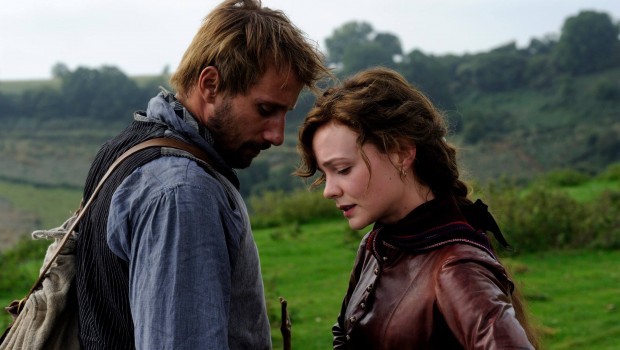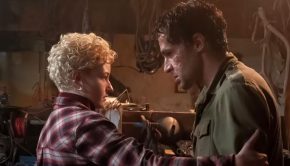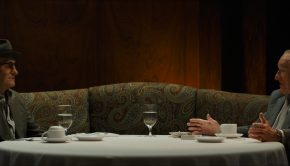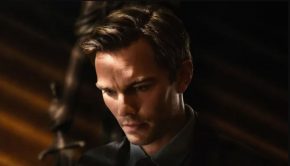Far from the Madding Crowd – Film Review
Reviewed by Damien Straker on June 21st, 2015
Fox presents a film by Thomas Vinterberg
Produced by Andrew Macdonald and Allon Reich
Written by David Nicholls, based on Far from the Madding Crowd by Thomas Hardy
Starring: Carey Mulligan, Matthias Schoenaerts, Michael Sheen, Tom Sturridge and Juno Temple
Music by Craig Armstrong
Cinematography Charlotte Bruus Christensen
Edited by Claire Simpson
Rating: M
Running Time: 118 minutes
Release Date: June 25th, 2015
Thomas Vinterberg’s Far from the Madding Crowd is an exquisitely photographed period film which engages through its performances and classical storytelling. There’s been no shortage of film, musical and play adaptations of Thomas Hardy’s 1874 novel, including a 1967 version starring Julie Christie. This version features Carey Mulligan as Bathsheba Everdene, a hard working farm girl in Victorian England who turns down the proposal of a sheep farmer named Gabriel (Rust and Bone’s Matthias Schoenaerts). In an incredible reversal of fortunes, Gabriel loses everything in his life when his flock of sheep escapes and tumbles over a cliff. Bathsheba inherits an enormous farming property and takes it upon herself to organise the workers. Gabriel becomes one of the men employed on the farm. Entering Everdene’s life are two other men from different backgrounds. One is the wealthy and persistent William Boldwood (Michael Sheen) who is determined to marry Everdene even though she dismisses his proposal. The other man is Sergeant Frank Troy (Tom Sturridge), whose partner (Juno Temple) failed to arrive at the right church on time to marry him. Frank is initially the only one out of the three men to win Everdene over and arguably the worst choice for her.
In an interview with TimeOut London, Carey Mulligan recently lamented the state of the film industry as being “massively sexist” and stated: “There’s a lack of material for women. A lack of great stories for women.” These limitations and frustrations are visible in Mulligan’s own filmography. After drawing comparisons with Audrey Hepburn when An Education (2009) was released and strong work in Never Let Me Go (2010), she’s been relegated to side roles of differing quality. Shame and Inside Llewyn Davis were strong films but her parts in the Wall Street sequel, Drive and The Great Gatsby marginalised her input. Fortunately, as Everdene this is one of her very best performances to date and one which shows the full extent of her range. She gives a superb, highly charismatic turn, building Everdene as a symbol of female independence through her resilience, while also showing a great deal of emotion with only her eyes. It was important that the central casting of Everdene was strong because the character and her personality encompass the narrative’s central theme of individualism.
What’s at stake in this story is foremost Everdene’s very independence as a woman in a male dominated community and then, and only then, her relationships with the three men. The order of these two elements is imperative. Much like in An Education, Mulligan is again playing a character whose understanding of herself and her strength is tested through her relationships with men who aren’t always right for her. Perhaps the endurance of Hardy’s original story is because of its liberal values, which have sustained as people today continue be drawn towards feminist attitudes. The film is stylistically old fashioned but contemporary in its principles. It’s an adult rebuttal to so-called modern romances like Twilight which are aimed squarely at American teenagers and unrealistically dictate women’s unflinching loyalty and debt to men.
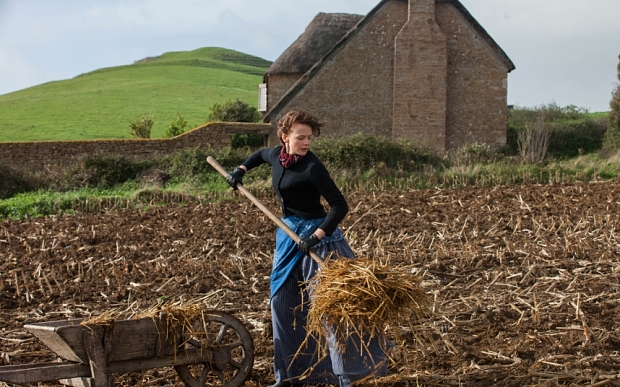
The film makes you understand each of Everdene’s suitors, what they offer her and why her attachment to them shifts. She rejects Boldwold’s wealth and persistence as it would compromise the test of her own stability and independence as an employer of men. While Gabriel is the most sympathetic, to marry him prematurely would result from pity given the reversal of their fortunes. Her eventual relationship and marriage to the obnoxious, arrogant Frank stems from the danger and risk he brings rather than the labour or materialism she already possesses. The action of Frank swinging a sword in her face directly aligns with Everdene’s desire to test her own personal endurance in a man’s environment and ultimately fuels her attraction to him.

Her journey to realise her strength in the face of a terrible ordeal is conveyed in the right tone. The film is serious and melodramatic but not overly stuffy or artificial and there’s some humour, like the forwardness of Boldwood’s first proposal which had some of the audience laughing. Maybe it’s the old fashioned formalities that people aren’t accustomed to which made it funny. The authenticity of the film’s period setting is further enhanced by Charlotte Bruus Christensen’s magnificent photography. She shot the director’s last film The Hunt and using 35mm format she doesn’t waste any part of the frame. On a large screen, the full depth of the image is used to show the deep rolling hills of the English countryside and the various fields where people are farming. While it’s not as brutal or challenging a film as The Hunt, and some might be thankful for that, it’s a solidly performed and visually impressive adaptation of an old fashioned period story. Any number of positive elements impress, including its progressive values and Mulligan’s excellent lead performance, who rather fittingly proves she can stand tall.
Summary: It's an adult rebuttal to so-called modern romances like Twilight which are aimed squarely at American teenagers and unrealistically dictate women's unflinching loyalty and debt to men.

